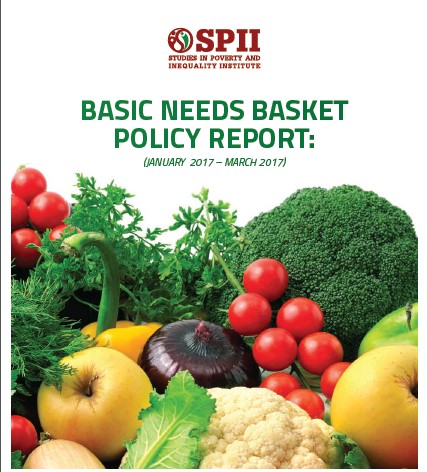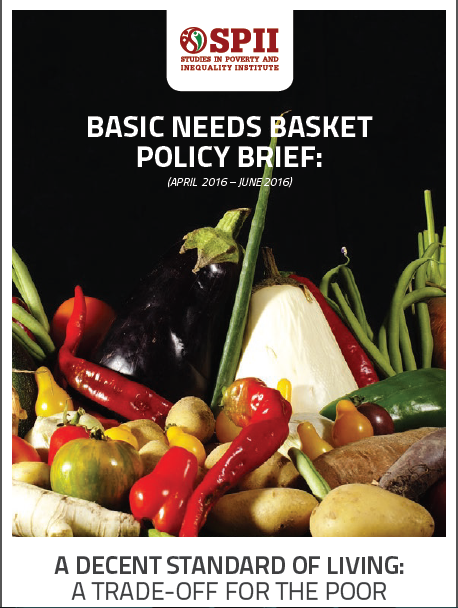BASIC NEEDS BASKET POLICY BRIEF
The High Cost of Being Poor
South African households continue to fight a fierce battle to survive in a year marked by increasing inflation, stationary wages and the
escalating scarcity of employment. In a recent report released by Statistics South Africa (Stats SA), the latest employment report paints a grim for job security in South Africa. The March 2017 Quarterly Employment Survey (QES)1 by Stats SA reports a 48 000 job loss suffered in the first quarter of the year, coupled with an unstable economy which has shrunk by a decrease of 0, 7% in GDP2 in the same period. Considering these harsh statistics, it is clear that the attainment of a decent standard of living for average South Africans is becoming ever more elusive.

A DECENT STANDARD OF LIVING: A TRADE-OFF FOR THE POOR
It is in this context that the Studies in Poverty and Inequality Institute (SPII) in partnership with the Association of Community-based Advice Offices of South Africa (ACAOSA), has re-launched its Basic Needs Basket (BNB) research project in South Africa in mid- 2014. The Basic Needs Basket is a monthly survey of the cost of essential food and non- food items that comprise the items that a low income family in both rural and urban areas across the nine provinces of South Africa consider to be basic necessities. The BNB project seeks to generate information regarding the impact of price inflation on the spending power on goods and services that are frequently consumed by low income households.
It is important to note that the BNB only monitors prices of the most common pack size purchased and not the actual quantities required for an average sized household. The qualitative approach of the BNB project is concerned mainly with understanding people’s descriptions of their basic everyday needs, in so doing, to attempt to ascertain perceptions of the requirements of a decent level of living. Further to this, the project aims to develop a costed basket of basic needs that is endorsed by a democratic majority of participants. Through the collected data, SPII aims to advocate for government to take the necessary steps to ensure that workers receive fair wages, and social cash transfer beneficiaries receive above inflation increases on their grants in order to afford to live a decent standard of life as well as meet their basic needs.

THE PRICE OF A DECENT STANDARD OF LIVING IN A STAGNANT ECONOMY
It is in this context that the Studies in Poverty and Inequality Institute (SPII) in partnership with the Association of Community-based Advice Offices of South Africa (ACAOSA), has re-launched its Basic Needs Basket (BNB) research project in South Africa in mid- 2014. The Basic Needs Basket is a monthly survey of the cost of essential food and non- food items that comprise the items that a low income family in both rural and urban areas across the nine provinces of South Africa consider to be basic necessities. The BNB project seeks to generate information regarding the impact of price inflation on the spending power on goods and services that are frequently consumed by low income households. It is important to note that the BNB only monitors prices of the most common pack size purchased and not the actual
quantities required for an average sized household. The qualitative approach of the BNB project is concerned mainly with understanding people’s descriptions of their basic everyday needs, in so doing, to attempt to ascertain perceptions of the requirements of a decent level of living. Further to this, the project aims to develop a costed basket of basic needs that is endorsed by a democratic majority of participants. Through the collected data, SPII aims to advocate for government to take the necessary steps to ensure that workers receive fair wages, and social cash transfer beneficiaries receive above inflation increases on their grants in order to afford to live a decent standard of life as well
as meet their basic needs.

Recent Posts
- Can we afford NOT to have a BIG in South Africa? – Podcast
- Joint Stakeholder Submission on the Right to Adequate Standard of Living in South Africa
- SPII’s Contribution – Submission to UN CESCR
- Political Elites Must Break Ranks to Crush Poverty, Inequality
- Podcast: High Price to Pay for the Rising Cost of Living
- More People Believe They Are Living Under Poverty in South Africa
- Nkululeko Majozi Speaking on Subjective Poverty in South Africa
- Podcast: In The Ring With Eusebius McKaiser – Can we afford a Basic Income Grant?
- Extending the Social Relief of Distress grant is not enough to alleviate plight of poor, says civil society
- Global Basic Income Grant Pilots Since 2000











